
I have a lawyer who handles all of my legal work. Why should I retain an attorney who concentrates in construction law? - by Andrew Richards

All too often I am approached by a prospective client to discuss a dispute regarding a project that is either under construction or has been completed where I must inform the prospective client that the contract terms do not support its position. Whether the prospective client wants to terminate the contract, suspend work, or make a claim for extra work, in many cases the contract does not contain terms which allow the owner or contractor to take the action it deems appropriate.
The prospective client proceeds to tell me that their attorney, who handles all the company’s legal work, either prepared the contract or is handling the litigation. What becomes clear from reading the contract or assessing the litigation is that the attorney is not familiar with the process of construction, what issues generally end up in disputes, the clauses that should be inserted in the contract to protect the client for these common issues of dispute, or the laws and statutes regarding construction disputes.
For instance, a well written construction contract for an owner should include provisions for:
- A quick termination if the contractor is not performing to the satisfaction of the owner
- A termination for convenience
- Liquidated damages
- Notice provisions as conditions precedent for extra work claims and time extensions, which are not included or, if included in a pre-printed form of contract, are insufficient to protect the owner.
If we are representing the contractor, provisions reserving rights to make claims, a quick suspension of work or termination of the contract for non-payment and payment for extra or disputed work are included in the contract.
We also make sure that day in and day out, you’re provided with proper advice, as needed, regarding disputes that arise during the construction of a project. By having the knowledge of construction law, the terms of the contract and the construction process itself, we can help the client avoid litigation or make sure the client has complied with all terms of the contract and any pertinent statute so that the client is in a strong position if litigation is unavoidable. Does your attorney keep up with the changes in statutes that govern construction claims? Our office follows bills making their way through the NYS Legislature to see if they become law, and so that we can familiarize ourselves with the potential statute to be ready for whatever resulting changes may be caused by the statute.
Issues arise throughout each construction project. For example, you must ask yourself, “is the work the contractor asked to perform included in the scope of the contract”? Will delays to the project entitle a contractor to an extension of time to complete the project? These questions are not only asked on the project, but also in the courtroom. Also, before hiring an attorney to draft construction contracts or represent you in construction litigation, you should ask him or her certain questions. How many times have they drafted such an agreement without having to refer to pre-printed forms? How many times have they represented a party in a construction dispute? A great construction lawyer should not only have the depth and knowledge of construction law, but also knowledge of the construction process itself.
At KDV, we take pride in the fact that we can service developers, contractors and subcontractors with all of their construction law, and labor and employment law needs. Our attorneys have decades of experience in both areas handling cases of all sizes. Whether the need is for a construction contract, advice during construction to avoid or resolve a dispute, the need to maintain construction in the face of a labor dispute, or post-project litigation, we have a number of attorneys who concentrate on these issues daily. Each and every developer, contractor and subcontractor should ask themselves; does my attorney deal with the issues and practice in these areas each and every day? If not, speak with KDV.
Andrew Richards is a co-chair of the construction law practice, and co-managing partner of Kaufman Dolowich Voluck, LLP’s Long Island headquarters in Woodbury, N.Y.